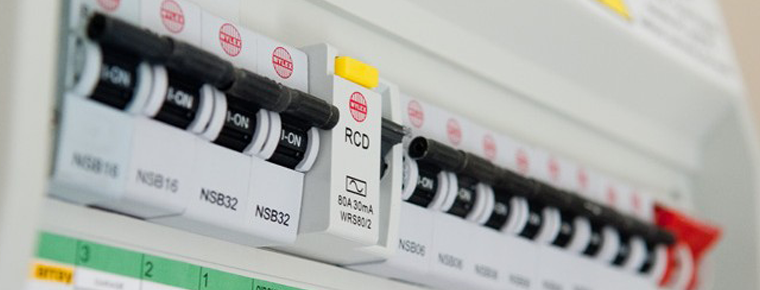What is meant by a consumer unit?
A consumer unit is an electrical distribution board that controls the distribution of electricity within the home. It incorporates fuses and circuit breakers, and modern units should also include a Residual Current Device. Older consumer units were commonly known as fuse boards or fuse boxes.

I need to replace an old fuse box or upgrade my consumer unit. To whom should I trust the job?
Trust Gregor to fix it!
Gregor electricians have expert knowledge of consumer units. We fit new consumer units in the Bristol and Bath area every week, and have thousands of satisfied customers.
How do I know if I need to replace my consumer unit?
There are several signs that may indicate that you need to replace your consumer unit, but among the most common are:
- Your existing installation has fuses only, and no Residual Current Device (see below).
- The body of your consumer unit is made of wood or plastic.
Can I consult a qualified electrician about my consumer unit?
Of course!
Gregor electricians are happy to advise you, and can also quote you on the cost of installing a new consumer unit.
The electrical consumer units we supply and install are fully compliant with all the latest regulations.
Call Gregor today on 0117 935 2400 for a chat with one of our qualified electricians.
What is a Residual Current Device, and what protection does it offer?
A Residual Current Device (RCD) is a sensitive safety device that monitors the flow of electricity through a circuit (or group of circuits). The RCD quickly cuts off the supply of electricity if electrical current is detected flowing somewhere unintended, e.g. through a person who has touched a live part such as a bare wire.
So it gives you and your family much better protection against potentially fatal electric shocks than older technologies such as circuit breakers and fuses.
Electric shock fatalities have been in long-term decline since the 1970s thanks to improved safety awareness. But official government figures for the period from 2004 to 2013 still show a total of 86 deaths from electric shock in the home and 128 deaths from electric shock elsewhere. This can be seen from Figure 2 on Page 9 of this document.
Residual Current Devices are absent from many older Consumer Units. Upgrading the Consumer Unit in your home to one that features Residual Current Device technology is an easy and inexpensive way to provide better protection for your family against dangerous electric shocks.
All consumer units supplied by Gregor include RCD devices, giving your whole house the protection of a circuit breaker. This protects you against electric shock and can save your life.
For more information on RCDs, see the page of the Electrical Safety Council.
Why are consumer units with wooden or plastic bodies unsafe?
Consumer units with wooden or plastic bodies may be combustible in the event of a fire breaking out because both wood and plastics tend to burn easily. They are therefore not compliant with the new regulations for non-combustibility.
On January 1st, 2016, Regulation 421.1.201 (Protection Against Fire Caused By Electrical Equipment) came into force in the UK. This regulation stipulates that consumer units must be manufactured from non-combustible metal or enclosed in a cabinet constructed of non-combustible material.
The units we supply have metal bodies that are fully compliant with these new regulations.
More information about this regulation is available from the Electrical Safety Council.
Could my smart meter be combustible?
Possibly, if it has not been installed correctly. There have been instances of house fires caused by incorrectly installed smart meters.
If you have a smart meter and are concerned about fire safety issues, in the first instance, always call your utility provider. If you still have serious concerns, call Gregor for a chat, and we can arrange for one of our electricians to check it over and advise you.
More information on the safe installation of smart meters is available from the Electrical Safety Council.




